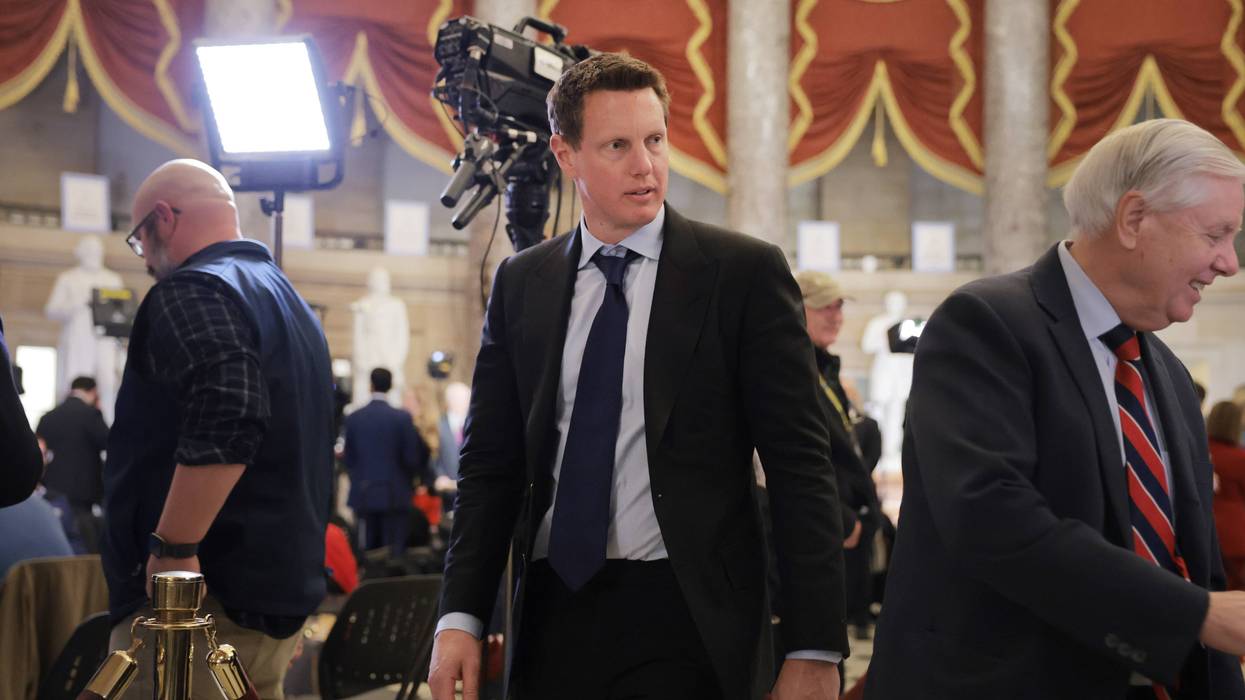July, 06 2009, 01:54pm EDT
For Immediate Release
Contact:
Taruna Godric
taruna@therealnews.com
www.therealnews.com
416 916 5202 ext 423
Full Spectrum Dominance
William Engdahl on his book Full Spectrum Dominance: Totalitarian Democracy in the New World Order
WASHINGTON
William Engdahl speaks to TRNN Senior Editor Paul Jay about his new
book, Full Spectrum Dominance: Totalitarian Democracy in the New World
Order.
Engdahl explains that the book's title is "Pentagon-ese" for "the basic
military doctrine of the post-Cold War era." He states that "full
spectrum dominance" describes the ambitious reach of American military
expectations. "The United States military power projection will control
the oceans, control the land areas of this planet, will control space,
outer space, and cyberspace. In other words, control everything on the
face of the earth."
He explains "totalitarian democracy" as the extension of the
Pentagon's influence abroad in foreign governments by installing
"pseudo-democratic revolutions," giving the Orange Revolution in
Ukraine and the Rose Revolution in Georgia as examples.
"[Totalitarian democracy] is the Pentagon template for creating
pseudo-democratic revolutions, quote unquote democratic in the sense
that the Greek oligarchs used the word democracy as a mob rule against
their opponents, inciting the mobs to topple their rivals," Engdahl
says.
The goal behind most of American military projects, Engdahl says, is the idea that for "the Pentagon, for the Washington
military industry complex, the Cold War never ended."
Engdahl
quotes Zbigniew Brizineski from The Grand Chessboard, stating that "the
objective of the United States power projection is to prevent a
cohesion of economic powers throughout Eurasia, that is Russia, that is
China, the Central Asian countries, the Middle Eastern oil-producing
countries, that would have enough raw material resources, enough
population, enough scientific know-how to be independent of the United
States, and that would essentially mean the end of the American
hegemony of the post-1945 era."
Engdahl notes the declining influence of this American power
projection as groups like the Shanghai Cooperation Organization,
comprising of Eurasian countries like China and Russia, gains more
eminence in the world. He states that the high debt the US owes to
countries in the Shanghai group, and the precarious economic situation
in America, are being buffered by other relationships and trade
agreements that China and Russia are building to protect their
economies.
To Jay's question of how a country like China could help the US in
its current economic state, Engdahl responds, "There's nothing China
could do, short of committing national economic suicide, along with
other countries of the European Union, to save that dollar-indebted
system. The US is in a debt trap of its own making."
To view the complete video, please click on the link below:
https://therealnews.com/t/index.php?option=com_content&task=view&id=31&Itemid=74&jumival=3966&updaterx=2009-07-06+10%3A03%3A27
The Real News Network is a television news and documentary network focused on providing independent and uncompromising journalism. Our staff, in collaboration with courageous journalists around the globe, will investigate, report and debate stories on the critical issues of our times. We are viewer supported and do not accept advertising, government or corporate funding.
LATEST NEWS
'Antitrust Disaster': Son of Billionaire Trump Donor Poised to Take Over Warner Bros.
"A handful of Trump-aligned billionaires are trying to seize control of what you watch and charge you whatever price they want."
Feb 27, 2026
Netflix announced Thursday that it would not continue its effort to acquire Warner Bros. Discovery, paving the way for Paramount Skydance—a company controlled by the son of billionaire Trump donor Larry Ellison—to take over the media giant after a lengthy bidding war.
The news came after Netflix CEO Ted Sarandos visited the White House and met with members of President Donald Trump's staff, raising suspicions about the role the administration may have played in pushing the streaming giant to drop its bid for Warner Bros. and cede the fight to David Ellison's Paramount. Along with other major media properties, Warner Bros. owns CNN, a frequent target of Trump's ire.
"What did Trump officials tell the Netflix CEO today at the White House?" asked Sen. Elizabeth Warren (D-Mass.), calling the potential Paramount-Warner Bros. merger "an antitrust disaster threatening higher prices and fewer choices for American families."
"A handful of Trump-aligned billionaires are trying to seize control of what you watch and charge you whatever price they want," Warren added. "With the cloud of corruption looming over Trump’s Department of Justice, it’ll be up to the American people to speak up and state attorneys general to enforce the law."
In a statement that appears to have stunned Hollywood, Netflix announced Thursday that it would not raise its offer for Warner Bros. after that company's board deemed Paramount's latest offer of $111 billion "superior." Netflix said it determined the pursuit of Warner Bros. was "no longer financially attractive."
"Ellison will readily throw the First Amendment, CNN’s reporters, and HBO’s filmmakers under the bus if they stand in the way of expanding his corporate empire and fattening his pockets."
Ellison, for his part, said he was "pleased" that the Warner Bros. board "affirmed the superior value of our offer, which delivers to WBD shareholders superior value, certainty, and speed to closing."
The proposed Paramount-Warner Bros. merger still must receive regulatory approval in the US and Europe. Critics have voiced concerns about the legitimacy of a US Justice Department review given the recent ouster of antitrust chief Gail Slater.
State attorneys general could also intervene. Rob Bonta, the attorney general of California, emphasized in a statement that "Paramount/Warner Bros is not a done deal."
"These two Hollywood titans have not cleared regulatory scrutiny—the California Department of Justice has an open investigation, and we intend to be vigorous in our review," said Bonta.
On top of antitrust concerns, critics of the potential Paramount-Warner Bros. merger warned it would be a disaster for journalism and free expression. David Ellison acquired CBS News last year through the Paramount-Skydance merger approved by the Trump administration, and he is now poised to take over CNN, HBO, and other major platforms.
"Ellison has already shown his cards," said Seth Stern, chief of advocacy at the Freedom of the Press Foundation. "When the Trump administration unconstitutionally demanded editorial concessions from Ellison’s Skydance in exchange for government approval of its takeover of Paramount and CBS News, he obliged, even appointing a Trump loyalist as a so-called ‘bias ombudsman.’ CBS has since repeatedly censored journalists or altered its coverage to please Trump and his allies."
"There is no reason to believe that this proven capitulator will behave any differently this time around—in fact, he’s already reportedly promised Trump ‘sweeping changes’ at CNN, including firing people Trump dislikes," Stern said. "Ellison will readily throw the First Amendment, CNN’s reporters, and HBO’s filmmakers under the bus if they stand in the way of expanding his corporate empire and fattening his pockets."
"Lawmakers, state attorneys general, and anyone else in a position to intervene should make clear that they will not stand by as the Trump administration abuses its power to unconstitutionally extract content-based concessions from news companies," he added.
Keep ReadingShow Less
Anthropic CEO 'Cannot in Good Conscience Accede' to Pentagon's AI Demand
"Anthropic and Dario deserve credit for standing up for two very basic and obvious principles: no mass surveillance and no autonomous killer robots," said one progressive commentator.
Feb 26, 2026
Defense Secretary Pete Hegseth gave Anthropic until Friday evening to agree to let the Pentagon use the company's artificial intelligence technology however it wants, or else. Roughly 24 hours ahead of the deadline, CEO Dario Amodei announced that "we cannot in good conscience accede to their request," and reiterated opposition to enabling autonomous weapons or surveillance of US citizens.
Anthropic's Claude was the first AI model allowed to handle classified US military data. While the Department of Defense (DOD) has now signed an agreement with Elon Musk's xAI and "is getting close to making a deal with Google," as the New York Times reported Monday, Hegseth demanded "unfettered" access to Claude during a Tuesday meeting with Amodei.
Hegseth threatened to declare the Anthropic a "supply chain risk," effectively blacklisting it for military use and ending its current contract, or invoke the Defense Production Act, which would force Anthropic to tailor the product to the DOD’s needs, if Amodei refused to drop the company's guardrails.
The CEO responded publicly with a Thursday blog post. Using President Donald Trump's preferred name for the Pentagon, he wrote that "Anthropic understands that the Department of War, not private companies, makes military decisions. We have never raised objections to particular military operations nor attempted to limit use of our technology in an ad hoc manner."
"However, in a narrow set of cases, we believe AI can undermine, rather than defend, democratic values. Some uses are also simply outside the bounds of what today's technology can safely and reliably do," Amodei continued. He explained the company's position that "using these systems for mass domestic surveillance is incompatible with democratic values."
"AI-driven mass surveillance presents serious, novel risks to our fundamental liberties. To the extent that such surveillance is currently legal, this is only because the law has not yet caught up with the rapidly growing capabilities of AI," he wrote. "For example, under current law, the government can purchase detailed records of Americans' movements, web browsing, and associations from public sources without obtaining a warrant, a practice the Intelligence Community has acknowledged raises privacy concerns, and that has generated bipartisan opposition in Congress. Powerful AI makes it possible to assemble this scattered, individually innocuous data into a comprehensive picture of any person's life—automatically and at massive scale."
The CEO also argued that "frontier AI systems are simply not reliable enough to power fully autonomous weapons. We will not knowingly provide a product that puts America's warfighters and civilians at risk." He noted that Anthropic offered to work directly with the department on research and development to "improve the reliability of these systems, but they have not accepted this offer."
Amodei concluded by expressing hope that the Pentagon revises its position, writing that "our strong preference is to continue to serve the department and our warfighters—with our two requested safeguards in place. Should the department choose to offboard Anthropic, we will work to enable a smooth transition to another provider, avoiding any disruption to ongoing military planning, operations, or other critical missions."
Amodei's blog post followed CBS News reporting earlier Thursday that "Pentagon officials on Wednesday night sent Anthropic their best and final offer in negotiations for use of the company's artificial intelligence technology."
It also came just hours after Pentagon spokesperson Sean Parnell responded to a related post from a Google scientist on Musk's social media platform X. The DOD official claimed that "the Department of War has no interest in using AI to conduct mass surveillance of Americans (which is illegal) nor do we want to use AI to develop autonomous weapons that operate without human involvement. This narrative is fake and being peddled by leftists in the media."
"Here's what we're asking: Allow the Pentagon to use Anthropic's model for all lawful purposes. This is a simple, commonsense request that will prevent Anthropic from jeopardizing critical military operations and potentially putting our warfighters at risk. We will not let ANY company dictate the terms regarding how we make operational decisions," Parnell added, noting the Friday deadline and the threat to "terminate our partnership with Anthropic and deem them a supply chain risk."
While Amodei and observers await the Pentagon's next move, several Anthropic employees, other tech experts, and critics of the Trump administration praised the CEO for "standing on principle" and choosing "war with the Department of War."
"Anthropic and Dario deserve credit for standing up for two very basic and obvious principles: no mass surveillance and no autonomous killer robots," said progressive commentator Krystal Ball. "Perhaps this is a low bar but it isn’t clear any of the other leading AI companies would put principle above profits in ANY scenario. The Pentagon is sure to make Anthropic pay for daring to defy them."
Keep ReadingShow Less
Trump's Revived Anti-Worker Rules Condemned as 'Outright Grift'
"Every day, little by little, the Trump administration is rigging the system to benefit giant corporations and shortchange workers," said one senator.
Feb 26, 2026
President Donald Trump's "barrage of attacks on workers" continued on Thursday with announcements about two key labor rules.
The US Department of Labor (DOL) proposed an independent contractor rule that the National Employment Law Project (NELP) called "yet another example of the administration siding with major corporations and stacking the deck against working people" by "effectively allowing employers to strip workers of federal minimum wage and overtime protections."
The DOL's Wage and Hour Division proposal would replace the Biden administration's widely celebrated 2024 policy for when employers can treat workers as independent contractors under the Fair Labor Standards Act with business-friendly guidance that resembles a rule adopted just before the end of Trump's first term.
"This rule will have profound real-world consequences for working people," warned NELP. "Misclassification is common in many labor-intensive, poorly paid jobs—jobs like home healthcare, janitorial work, landscaping, personal services, and increasingly, app-dispatched ride-hail and delivery—where people of color and immigrants are overrepresented, and workers lack the bargaining power to negotiate higher wages and better working conditions."
NELP pointed to research showing that low-paid independent contractors "lag behind their employee counterparts," and some "do not even earn the federal minimum wage." The organization stressed that "this rule threatens to enshrine a two-tiered labor system where similarly situated workers receive vastly different rights and protections based on the classification chosen by the business employing them."
The new rule—which now faces a 60-day public comment period—focuses on two "core factors" to determine an employee's classification: the nature and degree of control over the work, and the worker's opportunity for profit or loss based on initiative or investment.
NELP argued that "by elevating two factors above other equally important factors, the Trump administration's test fails to account for the economic realities of many working relationships. Many workers labeled as independent contractors are not really in business for themselves because they are integrated into the operations of a larger business structure that sets most of the terms of the work."
"In app-dispatched ride-hail and delivery jobs, for example, corporations like Uber, Lyft, DoorDash, and Amazon use apps and algorithms to offer shifts or assignments to so-called independent contractors doing the core work of the business, set the wages these workers receive, surveil and assess their performance, and determine if they are offered future assignments or get 'deactivated,'" the group noted. "App-based ride-hail and delivery workers perform difficult and dangerous work without basic employment protections like the right to minimum wage and overtime, workers' compensation, and unemployment insurance."
As NELP and other critics sounded the alarm over the DOL proposal on Thursday, the National Labor Relations Board (NLRB) also revived an effort from Trump's first term, reinstating that administration's 2020 rule on joint employers.
During Trump's initial administration, the NLRB required joint employers to "possess and exercise substantial direct and immediate control" over at least one aspect of the workers' employment. In 2023, under former President Joe Biden, the board decided that two or more entities could be considered joint employers if they had an employment relationship with the workers and helped to determine their terms and conditions of employment. However, the latter was blocked by a Trump-appointed judge the next year.
Unlike the DOL proposal, the board's rule is final. The NLRB—which has two Trump appointees, one Biden appointee, and two vacancies—said in the Federal Register that "the 2023 rule was vacated by the district court, and the action the board takes today merely implements the court's decision. Our action is ministerial and therefore will have no separate economic effect."
US Sen. Patty Murray (D-Wash.), a senior member and former chair of the Senate Health, Education, Labor, and Pensions Committee, declared in a Thursday statement that "every day, little by little, the Trump administration is rigging the system to benefit giant corporations and shortchange workers—it's an outright grift and working people should be furious."
"The joint employer rule is nothing more than a return to Trump's anti-worker policies that let giant corporations skirt their basic obligations to employees—Trump is giving the biggest corporations cover to deny workers their ability to band together for better wages and working conditions and leaving millions of workers in the lurch, vulnerable to egregious violations of their rights," she said.
"At the same time, today, the Trump administration announced they're working to rescind the independent contractor rule," Murray continued. "Trump wants to let giant corporations classify workers as contractors so that they don't have to pay them minimum wage and overtime—these workers deserve fair pay."
The senator then took aim at the so-called One Big Beautiful Bill Act that congressional Republicans passed and the president signed last summer, saying that "under the Trump administration, giant corporations get giant tax breaks paid for by cutting Medicaid—the healthcare that the poorest workers are forced to rely on."
"Now, Trump wants those same corporations off the hook for every benefit, protection, and dollar they'd otherwise owe to millions of workers—it's a shakedown," she asserted. "Republicans are proving time and again, they don't care about workers—they don't want to even let workers have crumbs, but billionaires can get trillions in tax breaks that will blow up our national debt."
Murray isn't up for reelection in November's closely watched midterms, but could lead the Senate Appropriations Committee if Democrats reclaim the chamber. On Thursday, she vowed that "I am going to keep fighting for laws on the books that protect workers and build an economy that grows the middle-class, not just profit margins for the largest corporations on Earth."
Keep ReadingShow Less
Most Popular


